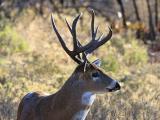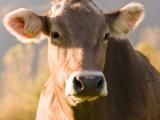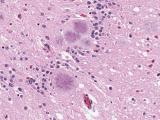Apr 14, 2006 (CIDRAP News) Preliminary testing has pointed to bovine spongiform encephalopathy (BSE), or mad cow disease, in a 6-year-old dairy cow from southern British Columbia, the Canadian government announced yesterday.
If further tests confirm the disease, the cow will be Canada's fifth case of BSE. But no part of the cow entered the human food or animal feed systems, and the carcass is under the government's control, the Canadian Food Inspection Agency (CFIA) said.
The cow, from a Fraser Valley farm, was identified through Canada's national BSE surveillance program, the agency said. After screening tests yielded inconclusive results, samples from the cow were sent to the National Centre for Foreign Animal Disease in Winnipeg for further testing.
"The first part of this process has been completed and produced a preliminary positive result," the CFIA said. "Final testing is now under way and will be completed over the holiday weekend."
Because of government safeguards, the potential case has "no bearing on the safety of Canadian beef," the agency said. Tissues where BSE is known to concentrate in infected animals are removed from all cattle slaughtered in Canada, cattle at increased risk are tested, and the use of cattle protein in cattle feed is banned.
Four BSE cases have been found in Canada, the first one in May 2003. The last confirmed case was identified in January of this year in a 6-year-old cow in northern Alberta. The first case led to a 2-year ban on shipments of live Canadian cattle into the United States. The US border was reopened in July 2005 to Canadian cattle younger than 30 months old.


















